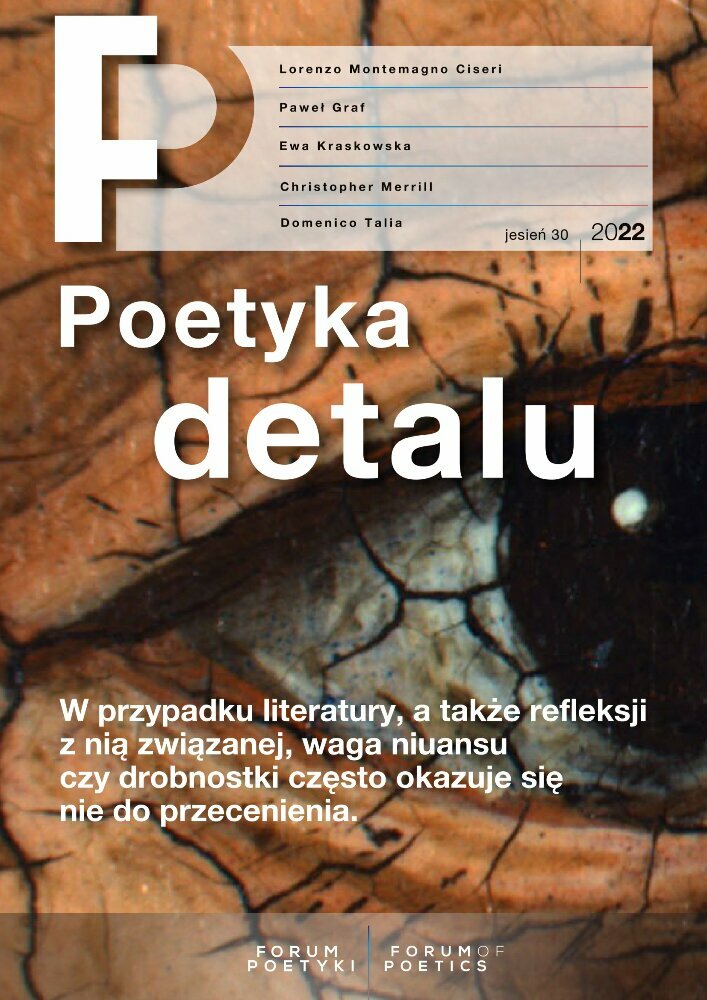Abstrakt
Szkic poświęcony został analizie wierszy Marcina Ostrychacza zebranych w tomie Cielenie lodowca. Celem artykułu jest przyjrzenie się im przy użyciu powracających w ekokrytycznym dyskursie pojęć środowiskowej katastrofy oraz trudnej do wyobraźniowego przetworzenia skali, na której ta się odbywa. Autor stara się dowieść, że wykorzystując kategorię detalu, poeta dąży do odzyskania nad nimi konceptualnej kontroli. Celowe zobaczenie Ziemi jako detalu na kosmicznym obrazie pozwala mu na przetworzenie rozciągniętych na planetarnym planie zjawisk oraz wypracowanie określonej przeciwwagi dla świadomości uczestniczenia w pogłębiającym się kryzysie.
Bibliografia
Budnik, Agnieszka. „Od zagłady ludzkości do pytania o szczęście”. Wielkopolska. Kultura u podstaw, 14.08.2020. https://kulturaupodstaw.pl/od-zaglady-ludzkosci-do-pytania-oszczescie/.
Buell, Frederick. From Apocalypse to Way of Life. Environmental Crisis in the American Century. Nowy Jork: Routledge, 2003.
Buell, Lawrence. The Environmental Imagination. Thoreau, Nature Writing, and the Formation of American Culture. Cambridge: Belknap Press of Harvard University, 1995. DOI: https://doi.org/10.2307/j.ctv1nzfgsv
„Edgar Mitchell’s Strange Voyage”, People, 8.04.1974. https://people. com/archive/edgar-mitchells-strange-voyage-vol-1-no-6/.
Fiedorczuk, Julia. Cyborg w ogrodzie. Wprowadzenie do ekokrytyki. Gdańsk: Wydawnictwo Naukowe Katedra, 2015.
Fiedorczuk, Julia. Inne możliwości. O poezji, ekologii i polityce. Rozmowy z amerykańskimi poetami. Gdańsk: Wydawnictwo Naukowe Katedra, 2015.
Fiedorczuk, Julia. „Przeciw apokalipsie”, Przekrój, 11.08.2021. https://przekroj.pl/artykuly/felietony/przeciw-apokalipsie-julia-fiedorczuk.
Ganguly, Debjani. „Catastrophic Form and Planetary Realism”. New Literary History 2 (2020): 419–453. DOI: https://doi.org/10.1353/nlh.2020.0025
Keller, Lynn. Recomposing ecopoetics. North American Poetry of the Self-Conscious Anthropocene. Charlottesville: University of Virginia Press, 2017. DOI: https://doi.org/10.2307/j.ctv6sj6qg
LeGuin, K. Ursula. Nie ma czasu. Myśli o tym, co ważne. Tłum. Piotr W. Cholewa. Warszawa: Prószyński i S-ka, 2019.
Marzec, Andrzej. „«Jesteśmy połączonym z sobą światem»Timothy Morton i widmo innej wspólnoty”. Teksty Drugie 2 (2018): 88–101. DOI: https://doi.org/10.18318/td.2018.2.6
Ostrychacz, Marcin. Cielenie lodowca. Poznań: WBPiCAK, 2020.
Piechura, Joanna. „Zaangażować wyobraźnię”, Dwutygodnik, grudzień 2021. https://www.dwutygodnik.com/artykul/9874-zaangazowac-wyobraznie.html.
Popkiewicz Marcin. „6 Raport IPCC. Podsumowanie dla decydentów po polsku”. Nauka o klimacie, 10.11.2021. https://naukaoklimacie.pl/aktualnosci/6-raport-ipccpodsumowanie-dla-decydentow-po-polsku/.
Singer, Peter. Wyzwolenie zwierząt. Tłum. Anna Alichniewicz, Anna Szczęsna. Warszawa: Marginesy, 2018.
Szaj, Patryk. „Czas, który wypadł z ram. Antropocen i ekokrytyczna lektura tekstów literackich”. Forum Poetyki 24 (2021): 6–25. DOI: https://doi.org/10.14746/fp.2021.24.30229
Ubertowska, Aleksandra. „Krajobraz po katastrofie: natura, historia, reprezentacja”. W: Poetyki ekocydu. Historia, natura, konflikt, red. Aleksandra Ubertowska, Dobrosława Korczyńska-Partyka, Ewa Kuliś, 7–22. Warszawa: Instytut Badań Literackich PAN, 2019.
Widhe, Olle. „Modes of environmental imagination. The eco-movement and the representation of reality in Swedish children literature from 1967 to 1977”, Barnelitterært forskningstidsskrift 1 (2019): 1–16 DOI: https://doi.org/10.18261/issn.2000-7493-2019-01-04
Licencja
Prawa autorskie (c) 2022 Dawid Borucki

Utwór dostępny jest na licencji Creative Commons Uznanie autorstwa – Użycie niekomercyjne – Bez utworów zależnych 4.0 Międzynarodowe.
Za prawa cytowania fragmentów innych publikacji (tekstów, tabel, rycin oraz ilustracji) odpowiedzialni są autorzy artykułu.

